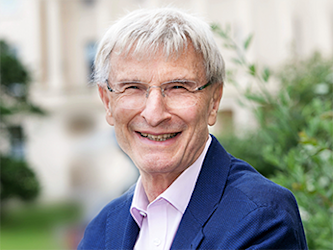Improving judgement in six steps
Sir Andrew Likierman’s body of work sheds important and fascinating light on human judgement.

We make countless decisions every day, most relatively trivial but some very important.
Decision making as a process is well understood. But the more complex decisions are typically underpinned by something seen as altogether harder to pin down; and that is judgement.
So what constitutes good judgement? Can it be understood in terms of processes and techniques? And is it something that can be taught and improved?
These questions are all the more critical in the age of artificial intelligence, with automation said to be poised to take over much of the work of human beings in the months and years to come. As we integrate AI in the workplace, the next question becomes: In a world powered by large language models and generative technology, will we come to rely on AI to exercise judgement?
No. We will need to rely on our own judgement, says Sir Andrew Likierman, Professor of Management Practice in Accounting and formerly the Dean of London Business School.
For more than a decade, Sir Andrew has researched human judgement in leadership and boards, in professions and in high-stakes environments, including grappling with the Covid pandemic. With experience in the private and public sectors as well as academic life, he has been spurred on by the knowledge of how important human judgement is in every field. He also believes in the continuingly important role it will play in the age of AI.
We recognise bad judgement when we see it: when things go wrong, stakeholders, organisations and the press will be quick to question the judgement of decision makers. Less clear is how to recognise good judgement. What’s more, our understanding of judgement is limited, and research on judgement remains scant, says Sir Andrew. Opinions differ about what judgement even is, and how to define it: whether it is simply common sense or gut feeling, a form of intelligence or a product of good luck. As a subject that spans many disciplines, he suggests that all this makes judgement hard to research and hard for scholars to publish on the topic.

Professor of Management Practice in Accounting
“Bad judgement is obvious when things go wrong but identifying good judgement has always been seen as more elusive. I’ve worked in many different environments and seen first-hand how critical good judgement is in each of them.”
Sir Andrew’s research has focused on human judgement since 2014, yielding game-changing insights. He has provided a clear definition of judgement for leaders and organisations based on a 6-element framework for using and improving judgement.
This work finds its roots in his earlier interest in performance measurement. There he focused on what was particularly difficult to measure, including the links between pay and performance. He saw judgement as an important measurement challenge first and his work broadened out from there. To meet that challenge, as well as delving into many literatures (“16 at the last count”), he has interviewed more than 800 people, from CEOs and Nobel prize-winners to people doing routine jobs, in more than 20 countries.
His findings have resulted in a definition and a framework for improving the chances of achieving aims by treating judgement as a process. The results have come out in a wide variety of publications and training programmes aimed at practitioners and, most recently a book, “Judgement at work: Making better choices,” published by Profile Books in 2025.
Sir Andrew defines judgement as “the combination of personal qualities with relevant knowledge and experience to make decisions or to form opinions.” He has broken the process of exercising good judgement down into six elements. These elements provide the basis of questions you need to ask yourself when making a judgement:
1. Knowledge and Experience: How much relevant knowledge and experience do I have? Note the “relevant”. We may know a lot or have lots of experience, but if it isn’t relevant, it won’t necessarily help us.
2. Awareness: Am I aware of what’s going on in making a judgement, particularly in terms of reading the situation in which a judgement has to be made? Those who don’t pick up the signals risk making poor judgements as a result.
3. Trust: Can I trust the people who are involved and the information I am getting? We have learned how unreliable social media can be. We know we need to be careful about who we can trust and who we can’t.
4. Feelings and beliefs: Do I have biases or emotions that get in the way of making a good judgement? As human beings, bias and emotion are part of what it means to be a human being. Having these is inevitable, but we also need to be aware of their influence and take that into account when we make a judgement.
5. Choice: Am I making the choice in a way that is likely to give me the best outcome? It may be that all the options have not been considered or that the group making the choice is dominated by a single individual.
6. Delivery (for decisions, not opinions): How likely is it that what I have decided on can be delivered? Having a brilliant idea is not enough. If it can’t be done, it isn’t a brilliant judgement.
Sir Andrew’s framework distinguishes judgement from decision-making. For example, judgement includes forming opinions, while decision-making does not. And the focus for judgement is on the person or people making the choice, not the choice in abstract. He suggests that using this framework helps stack the cards in favour of those making the judgement - particularly important when the stakes are high.
“It’s like a pilot entering the cabin and checking the instruments before take-off. There is reassurance in having a systematic method that ensures that a proper process has been undertaken before you make an important choice. Not only that, but when you reflect on the outcomes, you can identify how much was stacking the odds in your favour and how much was luck. That gives you the chance to learn for the future.”
“Board members have told me that they have found the booklet useful, including in board appraisals, because there is no existing judgement framework and many simply have not been clear about what the Companies Act requires.”
In 2025, the Family Firm Institute, the world’s foremost professional body for family enterprise professionals, appointed him Scholar in Residence, following his presentation on judgement in family businesses at their 2024 annual conference. This will see him contribute new lines of research and insight around improving judgement within family firms.
In the meantime his new book, published in 2025, Judgement at work: Making better choices, is set to reach new audiences round the world in an age where, with AI taking over many existing aspects of the world of work, understanding and exercising human judgement will be more critical than ever.
“Judgements are context specific, so it’s unrealistic to expect AI to be able to exercise judgement without being able to specify the outcome in particular circumstances. As AI takes over many tasks, judgement is one of the things that human beings have to offer, so the ability to exercise it becomes even more critical.”
In 2019, Sir Andrew submitted a memorandum to Sir Donald Brydon’s review of audit in the UK, suggesting that the profession would benefit from a more formal way of defining and assessing professional judgement, and putting his framework forward as a possible way of doing so. In his report, Sir Donald noted that Professor Likierman “breaks down professional judgement into its constituent elements and concludes that this analysis can form the basis for guidance and practice notes provided by firms for their staff, making clear what professional judgement is and providing a framework of how to use it… In its focus on judgement, his recommendations will sit very comfortably alongside the Principles which I enumerate later in the Report” (Independent Review into the Quality and Effectiveness of Audit).
In response, the regulator of the UK audit profession, the Financial Reporting Council, invited Sir Andrew to join a newly appointed committee to look at the issue of professional judgement in depth. As a result, a new professional judgement framework was released in 2022 and Sir Andrew was invited to present his work on judgement to the International Forum of Independent Audit Regulators.
“Professional judgement is known to be a major issue that regulators have found in accounting and auditing. Every year bodies like the FRC will cite errors of judgement. Addressing this issue with the FRC through the formalisation of a framework—a clear marker that firms can decide to use—has been good for everyone. Firms know what they have to do, while regulators know what they are looking for.”
On the back of this work, in 2023 the Institute of Chartered Accountants in England and Wales (ICAEW) invited Sir Andrew to create an online course on judgement for their professional development programme.
The programme, released in 2024, has already been delivered to thousands of practitioners, providing them with a clear framework to make some of their most difficult professional judgements, from revenue recognition to risk assessment to fraud and beyond. The International Forum of Independent Audit Regulators welcomed the new programme, acknowledging the place of professional judgement at the “heart of audit quality.”
Sir Andrew is currently developing further applications of his work. These include working with a number of major firms in training senior executives on how to improve their judgement. There are also new areas of application include judgement in wealth management, in using artificial intelligence and in career choice. Dissemination increasingly involves online courses, including a new London Business School Masterclass. On these next steps he commented “This is new territory for many people and I’m excited about what understanding judgement can do to help people and organisations.”
Our research is helping to solve some of society's most challenging questions and concerns.
Our faculty publish over 100 papers and articles every year, many of which are featured in top-ranked business journals. Discover what our researchers are working on and how they are shaping the world.